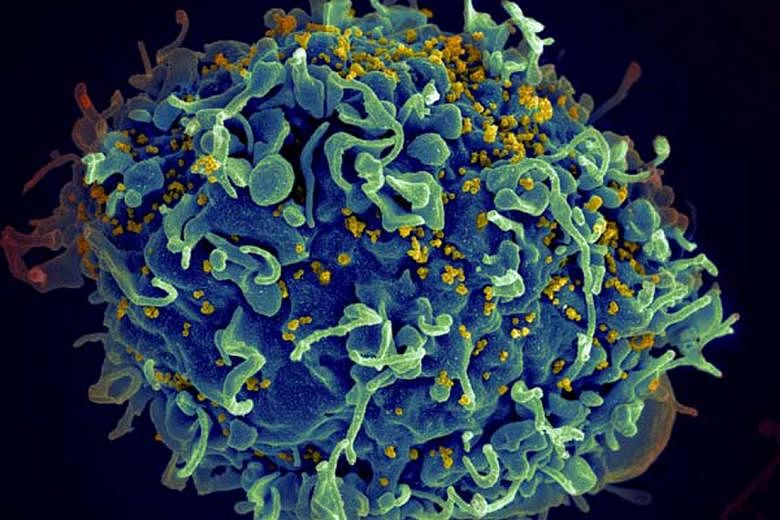People with the human immunodeficiency virus (HIV) are living longer, if diagnosed and treated early, thanks to advances in medicine.
Treatments have been able to effectively control the virus and lower the risk of transmission.
Dr Ng Oon Tek, consultant at Tan Tock Seng Hospital's (TTSH) Institute of Infectious Diseases and Epidemiology, said: "The improvement in HIV treatment has been phenomenal for any disease, let alone infectious disease. Twenty-five to 30 years ago, HIV was a terminal diagnosis but, now, we have seen mortality due to HIV drop dramatically." According to TTSH's internal analysis, a patient diagnosed in 2011 has 93 per cent less risk of dying compared to a patient diagnosed in the period between 1985 and 1998.
HIV affects cells of the immune system, mainly CD4 cells, or T cells, destroying or impairing their function. It is transmitted mainly through sexual intercourse, although it can spread in other ways, such as by sharing contaminated needles.
The most advanced stage of an HIV infection is the acquired immune deficiency syndrome (Aids), and it usually takes between 10 and 15 years for an infected person to develop Aids. Effective antiretroviral therapy drugs, however, can minimise that risk.
Introduced in the mid-1990s, antiretroviral therapy can reduce the amount of HIV in the blood to undetectable levels, enabling the immune system to recover and function almost normally.
The World Health Organisation (WHO) said "huge reductions" are seen in death rates when someone who is HIV-positive is put on a potent antiretroviral regimen, particularly in early stages of the disease.
According to overseas experts, without treatment, people who progress to Aids typically survive about three years. However, those on the proper medication can enjoy a near normal life span.
Dr Ng said there are now about 30 such antiretroviral drugs, and patients are typically given a combination of three drugs. They take the pills - ranging from one to five - usually once a day.
"We choose the best medication for the patient based on three main concerns - the potency of the medication against the virus, whether it is safe for the patient as some may experience side effects, and whether there will be adverse interaction with whatever medication they are taking concurrently."
At TTSH's Communicable Diseases Centre, 90 per cent of the 3,000 patients have no virus detected in their blood three to six months after taking the medication.
"For the remaining patients, in almost all cases, it is because they didn't take the medication routinely. In our experience, these medications are sufficient," said Dr Ng.
Dr Leong Hoe Nam, infectious diseases specialist at Rophi Clinic in Mount Elizabeth Novena Specialist Centre, added that if an HIV-positive person takes appropriate medication regularly and consistently, he is "practically non-infectious".
"We have couples who are trying for babies. We help them time the conception and they have unprotected sex during the periods when she is deemed fertile," he added.
Professor Roy Chan, who is on the governing council of the International Aids Society and president of Action for Aids, noted that HIV infection is no more a fatal infection, and modern antiretroviral therapy has "transformed it to a chronic disease". He added: "It must be reiterated that taking HIV medications daily indefinitely is a daunting task, and has social as well as medical consequences."
Earlier this week, actor Charlie Sheen confirmed rumours that he is HIV-positive. Dr Robert Huizenga, who is Mr Sheen's doctor, said the actor's daily medication has suppressed the virus and he is "absolutely healthy".
But there is still a long way to go in finding a cure for the disease. Dr Ng explained: "The reason is that the HIV is able to hide in a normal human genome... Our human body has trillions of cells. This means it's very hard to be rid of the virus - it's like looking for a needle in a haystack."
Dr Leong added that the virus mutates very easily, and there have been no consistent results despite talks of using bone marrow transplants or aggressive early therapy.
But he remains positive. "There is a term called 'elite controllers'. These are people who have HIV in them, but the virus is suppressed without any medications. The immunity has a way of coping and suppressing the virus," he said. "To me, this is the holy grail. Crack the code, and induce the same immunity for the rest of those with HIV, and we win."
Although HIV infection is no longer a death sentence, it remains one of the world's "most significant public health challenges", particularly in low- and middle-income countries, said the WHO. It is estimated that 36.9 million people were living with HIV globally at the end of last year.
Prof Chan added: "(The biggest myth to debunk) is that it is no more a public health issue and that people can become complacent. HIV infection rates are climbing again among gay and other MSM (men who have sex with men) communities in all parts of the world."
Going forward, TTSH's Dr Ng said that researchers are looking into improving the drugs. "In many cases, the improvements are to decrease side effects. The medication is already very potent, so it's not so much about increasing the strength," he said. "The second main area of research is new ways of administering the medications. We are looking into injections which can last three months, instead of having the patient take pills every day."
SEE SCIENCE:

